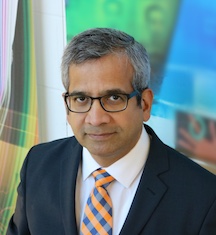By Venugopal V. Veeravalli (University of Illinois at Urbana-Champaign)
Talk Abstract:In the problem of quickest change detection, a change occurs at some unknown time in the distribution of a sequence of random vectors that are monitored in real time, and the goal is to detect this change as quickly as possible subject to a certain false alarm constraint. In this work we consider this problem in the presence of parametric uncertainty in the post-change regime and controlled sensing. That is, the post-change distribution contains an unknown parameter, and the distribution of each observation, before and after the change, is affected by a control action. In this context, in addition to a stopping rule that determines the time at which it is declared that the change has occurred, one also needs to determine a sequential control policy, which chooses the control action at each time based on the already collected observations. We formulate this problem mathematically using Lorden’s minimax criterion, and assuming that there are finitely many possible actions and post-change parameter values. We then propose a specific procedure for this problem that employs an adaptive CuSum statistic in which (i) the estimate of the parameter is based on a fixed number of the more recent observations, and (ii) each action is selected to maximize the Kullback-Leibler divergence of the next observation based on the current parameter estimate, apart from a small number of exploration times. We show that this procedure, which we call the Windowed Chernoff-CuSum (WCC), is first-order asymptotically optimal under Lorden’s minimax criterion, for every possible possible value of the unknown post-change parameter, as the mean time to false alarm goes to infinity. We also provide simulation results to illustrate the performance of the WCC procedure.
 Speaker Bio:Prof. Veeravalli received the Ph.D. degree in Electrical Engineering from the University of Illinois at Urbana-Champaign in 1992. He is currently the Henry Magnuski Professor in the Department of Electrical and Computer Engineering (ECE) at the University of Illinois at Urbana-Champaign, where he also holds appointments with the Coordinated Science Laboratory (CSL) and the Department of Statistics. He was on the faculty of the School of ECE at Cornell University before he joined Illinois in 2000. He served as a program director for communications research at the U.S. National Science Foundation in Arlington, VA during 2003-2005. His research interests span the theoretical areas of statistical inference, machine learning, and information theory, with applications to data science, wireless communications, and sensor networks. He is a Fellow of the IEEE. Among the awards he has received for research and teaching are the IEEE Browder J. Thompson Best Paper Award, the U.S. Presidential Early Career Award for Scientists and Engineers (PECASE), the Fulbright-Nokia Distinguished Chair in Information and Communication Technologies, and the Abraham Wald Prize in Sequential Analysis (twice).
Speaker Bio:Prof. Veeravalli received the Ph.D. degree in Electrical Engineering from the University of Illinois at Urbana-Champaign in 1992. He is currently the Henry Magnuski Professor in the Department of Electrical and Computer Engineering (ECE) at the University of Illinois at Urbana-Champaign, where he also holds appointments with the Coordinated Science Laboratory (CSL) and the Department of Statistics. He was on the faculty of the School of ECE at Cornell University before he joined Illinois in 2000. He served as a program director for communications research at the U.S. National Science Foundation in Arlington, VA during 2003-2005. His research interests span the theoretical areas of statistical inference, machine learning, and information theory, with applications to data science, wireless communications, and sensor networks. He is a Fellow of the IEEE. Among the awards he has received for research and teaching are the IEEE Browder J. Thompson Best Paper Award, the U.S. Presidential Early Career Award for Scientists and Engineers (PECASE), the Fulbright-Nokia Distinguished Chair in Information and Communication Technologies, and the Abraham Wald Prize in Sequential Analysis (twice).